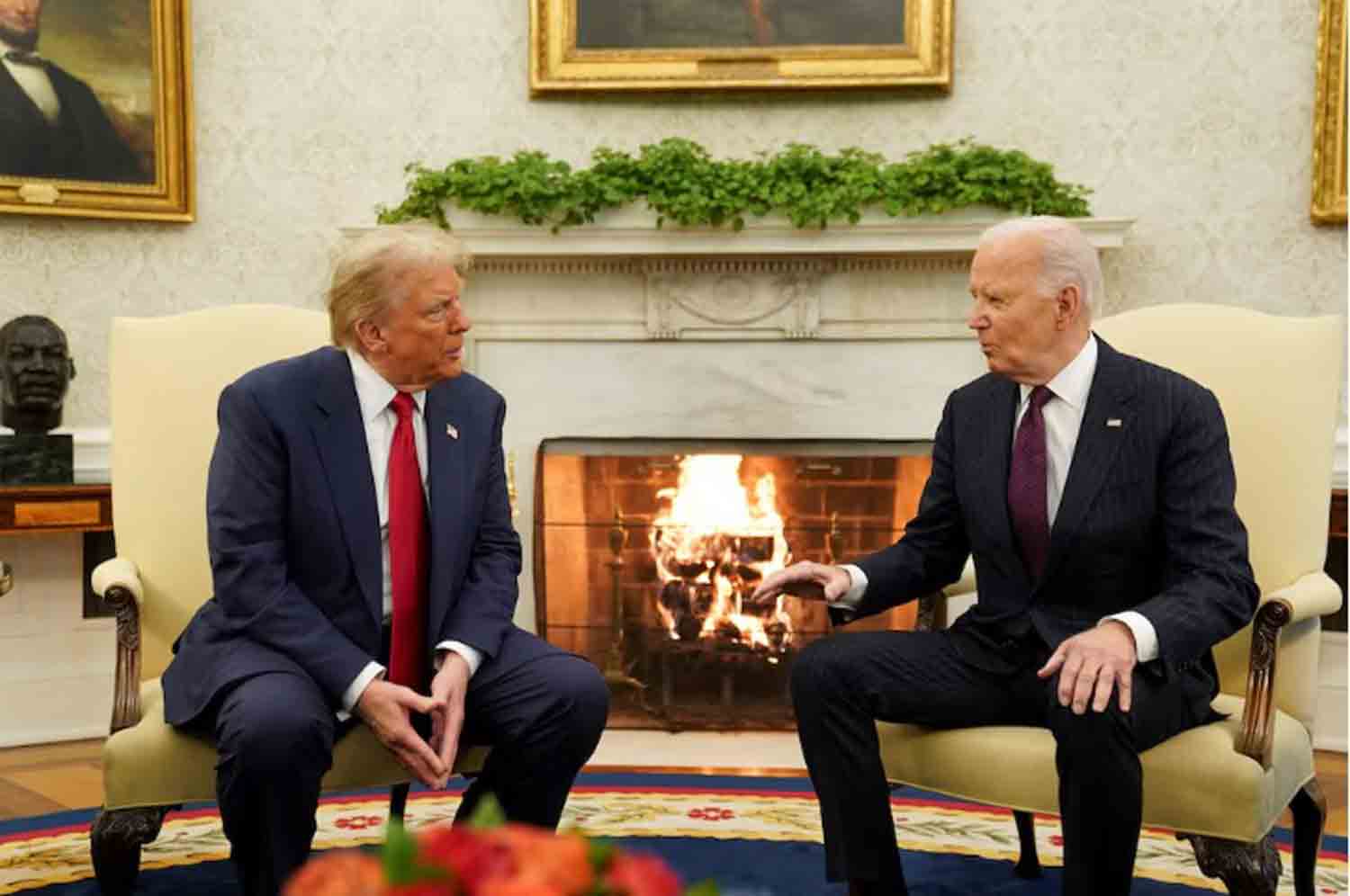U.S. President Joe Biden‘s national security adviser, Jake Sullivan, characterized the Middle East as “quieter” in late September 2023, marking a notable shift from the previous two decades. However, this assessment quickly proved inaccurate. Just eight days later, Hamas executed a surprise and lethal attack from Gaza into Israel, igniting a conflict that ravaged the Palestinian territory and unleashed chaos throughout the region. This series of events has overshadowed Biden’s foreign policy legacy as he approaches the end of his term on January 20.
Despite Biden’s team playing a crucial role in brokering a ceasefire deal that facilitated the release of hostages by Hamas, analysts suggest that his legacy in the Middle East will be defined more by the conflicts that escalated during his presidency rather than by their resolutions. This situation leaves a significant amount of unresolved issues for the next president, Donald Trump, and his administration.
Biden’s international reputation is likely to be significantly shaped by his management of the ongoing 15-month conflict in Gaza, which Trump and other Republicans have labeled as a “world on fire” during Biden’s administration. They criticize Biden for a perceived lack of resolve that has allowed adversaries to instigate disorder in the region. Conversely, Biden’s supporters argue that he has navigated a complex array of Middle Eastern challenges, many of which were not of his own making, and have effectively weakened Iran and its allies while striving to minimize civilian casualties in Gaza and Lebanon.
Biden’s unwavering support for Israel, which resulted in a significant blow to Hamas but also led to the deaths of tens of thousands of civilians in Gaza, severely impacted the United States’ international standing. This stance also created divisions within his Democratic Party, contributing to Vice President Kamala Harris’ loss to Trump in the November election.
“The positive aspect is that Biden positioned himself as a dependable ally for Israel,” noted Aaron David Miller, a former adviser on Middle Eastern affairs for both Democratic and Republican administrations. “However, the negative aspect is that he struggled to rein in Prime Minister Netanyahu in Gaza, which has inflicted considerable reputational harm on the U.S.”
The ceasefire plan for Gaza, finalized in the closing days of Biden’s presidency after extensive negotiations, was rooted in proposals he had introduced in mid-2024. Achieving this required relentless effort alongside Qatari and Egyptian mediators to bring it to fruition.
However, the last-minute diplomatic success in Doha was largely perceived by regional stakeholders as being influenced by Trump’s stern warnings that there would be “serious consequences” if hostages were not released by the time he took office on Monday. A source familiar with the Gaza negotiations described this threat as a “sword” looming over the discussions.
Trump sent his incoming Middle East envoy, Steve Witkoff, to work alongside Biden’s chief negotiator, Brett McGurk. An Israeli official indicated that Witkoff’s involvement provided additional momentum to the negotiations.
“Witkoff was instrumental in pressuring Netanyahu to accept the deal and act swiftly,” stated an official familiar with the discussions, referring to a meeting with the conservative leader who had developed a close rapport with Trump during his first term. Netanyahu’s cabinet is set to vote on the agreement on Thursday, with a majority of ministers anticipated to endorse it, according to an Israeli government official.
Secretary of State Antony Blinken presented a proposal for post-war Gaza on Tuesday, but the responsibility for ensuring the full execution of the ceasefire plan and determining the extent of involvement in the “Day After” will fall to the Trump administration.
BIDEN RECEIVES BOTH PRAISE AND CRITICISM
During his final year in office, President Biden has been recognized for building an international coalition that provided support to Israel against Iranian missile threats and for approving Israeli counterstrikes on Tehran’s air defenses, despite his cautions against targeting Iranian nuclear and oil facilities. In response to U.S. calls for restraint, Israel conducted multiple strikes against Hezbollah militants in Lebanon last year, often without prior notification to Washington. This aggressive approach was a significant factor in the Iran-aligned group’s acceptance of a U.S.-backed ceasefire in November.
The Biden administration was subsequently taken by surprise when a rapid rebel offensive led to the ousting of Syrian President Bashar al-Assad, another key Iranian ally, in early December. Since then, the administration has been working to encourage the new Islamist leadership to establish an inclusive government and to avert a resurgence of the Islamic State, responsibilities that will now be passed on to Trump.
Elliott Abrams, who served as Trump’s special envoy on Iran during his first term, commented, “The most significant achievement is that Biden did not obstruct Israel, although he consistently advised against certain actions.” He assessed Biden’s performance in the Middle East as “mediocre,” stating, “I don’t believe he merits much credit regarding Lebanon or Syria.”
In his farewell foreign policy address at the State Department on Monday, Biden defended his administration’s strategy, asserting that the U.S. has played a crucial role in making Iran “weaker than it’s been in decades.”
Some analysts have praised his efforts in preventing a full-scale regional conflict. However, Biden leaves Trump with what many experts consider the most significant challenge in the Middle East: an Iranian nuclear program that has progressed over the last four years and could rapidly advance toward weaponization if Iran chooses to do so.
Critics argue that Trump’s 2018 decision to withdraw from the international nuclear agreement with Iran paved the way for these developments, while Secretary of State Blinken highlighted that one of Biden’s achievements has been deterring Tehran from acquiring a nuclear bomb. Upon returning to office, Trump will face the decision of whether to negotiate a new nuclear agreement with Iran or to authorize military strikes on Iranian nuclear sites.
“The approach to Iran will significantly influence Trump’s broader regional strategy,” noted Jonathan Panikoff, a former U.S. deputy national intelligence officer for the Middle East. Additionally, Trump will need to address the ongoing threat from Yemen’s Houthis, who have been launching missiles at shipping in the Red Sea and targeting Israel for over a year. Biden’s military actions, coordinated with U.S. allies, have not succeeded in neutralizing the Houthi threat.
While recognizing that the Middle East is still “fraught with danger,” Blinken, in his concluding policy address, highlighted achievements he attributed to the administration, such as facilitating a U.N.-brokered ceasefire in Yemen’s civil conflict, bolstering the international coalition against the Islamic State, and enhancing regional cooperation.
SAUDI-ISRAEL NORMALIZATION EFFORT DISRUPTED
Sullivan faced significant criticism from Biden’s opponents following the Hamas attack on October 7, 2023, particularly for his remarks made just over a week prior, stating that the Middle East “is quieter today than it has been in two decades,” despite acknowledging ongoing challenges.
Although Sullivan later clarified his statements to NBC News, emphasizing they were based on recent regional trends and asserting that the administration remained focused, the long-standing Israeli-Palestinian conflict disrupted Biden’s international agenda.
In the wake of the Hamas assault, which resulted in the deaths of 1,200 individuals in Israel and the abduction of over 250 hostages, Biden, who identifies as a “Zionist,” became the first U.S. president to visit Israel during a time of war.
He subsequently maintained a consistent supply of arms to Israel for its stated mission to dismantle Hamas, which is backed by Iran, despite ongoing resistance from Netanyahu regarding U.S. calls to mitigate civilian casualties and alleviate the humanitarian situation in Gaza.
Biden’s reluctance to leverage U.S. influence as Israel’s primary arms supplier has estranged numerous Arab American voters and created significant unrest within the U.S. diplomatic community. “Gaza will be the legacy,” remarked Mike Casey, a former State Department official with 15 years of experience as a foreign service officer, who was among those who resigned in protest. “They will uncover bodies in the debris. People will continue to suffer from disease… It will always circle back to him.” The White House did not provide a response to inquiries regarding criticism of its policy on Gaza.
Simultaneously, the conflict in Gaza has hindered Biden’s attempts to facilitate a historic normalization agreement between Israel and Saudi Arabia, which would include U.S. security assurances for the kingdom. Some Arab nations are now observing whether Trump, who previously established diplomatic relations between Israel and several Arab countries through the Abraham Accords during his first term, will renew normalization initiatives and adopt a firmer stance against Iran.
Within Trump’s circle, there is a belief that an Israeli-Saudi agreement remains feasible, according to a source familiar with the discussions. However, despite some Arab allies maintaining relatively distant relations with Biden, they remain cautious of Trump due to his previous reluctance to pressure Netanyahu towards a pathway for Palestinian statehood, a longstanding Saudi prerequisite for normalization with Israel. “Biden hasn’t been perceived as the Arab world’s best ally,” stated a Middle East diplomat in Washington. “Yet, we are still uncertain about what to anticipate from Trump 2.0.”
Discover more from Defence Talks | Defense News Hub, Military Updates, Security Insights
Subscribe to get the latest posts sent to your email.





